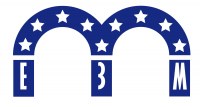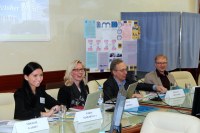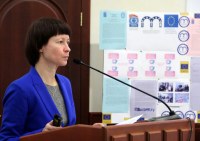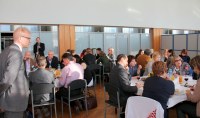

On October 12-16, 2015, the Educational Institution of Trade Unions & Higher Professional Education in Moscow held the international research and practical workshop “Exploitation of best European practices in the cooperation between Russian HEIs and working-life organizations” organized within “Evaluation of Quality of Cooperation in Education Ecosystem as a Mechanism for Building Professional Competencies - E3M” Tempus Project. The workshop welcomed project representatives from Finland, Spain, Austria, Belgium, and Russia. NVSU was presented by Irina Istomina, Dean of the Faculty of Pedagogy and Psychology, Gennady Malgin, Head of the Department of Power Engineering, Nadezhda Nemchinova, Head of the International Office, and Oksana Yakovishak, Project Manager of the International Office.
.jpg)
The workshop started with a project meeting of the consortium members and a discussion of workshop program, project as a whole, workshop format and expected outcomes. The Russian representatives shared the results of benchmarking visits to the European partner universities, which took place in December 2014 and May 2015. The European partners acting as the work package leaders made presentations devoted to the following issues: Publishing project materials (a monograph and a digital manual) (Artesis Plantijn Hogeschool Antwerpen, Belgium), Evaluation frameworks (University of Girona, Spain), Dissemination of the E3M project results in the project website (Carinthia University of Applied Sciences, Austria).

The second day was the day of legislative and executive authority experts, trade unions and business organizations. The program of the workshop included reports made by the representatives of the Labour Remuneration Department, Committee on Labour, Social Policy and Veterans Affairs, Department of Social and Labour Relations and Social Partnership of Independent Trade Unions of Russia and other authorities. The workshop continued with round tables with experts and re presentatives of partner universities, students and working-life organizations.
presentatives of partner universities, students and working-life organizations.
Round table discussions were devoted to the following issues:
1. How to exploit various kinds of university-working life collaboration practices inside and outside universities (other than inside the degree program curricula)?
2. How can stakeholders and shareholders benefit from better collaboration and how should exploitation be organized outside the university?
3. How to exploit new practices conducted in the degree program’s curriculum to other faculties inside the university?
4. How shall we motivate employers, teachers, teaching staff and students to joint work in exploitation of new forms of cooperation?

 The third day of the workshop included discussions of the implementation of the project, intermediate reports, and action plans. JAMK University of Applied Sciences acting as Project Coordinator presented an interim report, on the results of project implementation, which was compiled by the Executive Agency for Education, Audiovisual and Culture (Brussels, Belgium). After the report the project steering committee had a meeting, followed by the workshop summary, certificate delivery ceremony, and a visit to the Employment Center of the North-Eastern Administrative District of Moscow.
The third day of the workshop included discussions of the implementation of the project, intermediate reports, and action plans. JAMK University of Applied Sciences acting as Project Coordinator presented an interim report, on the results of project implementation, which was compiled by the Executive Agency for Education, Audiovisual and Culture (Brussels, Belgium). After the report the project steering committee had a meeting, followed by the workshop summary, certificate delivery ceremony, and a visit to the Employment Center of the North-Eastern Administrative District of Moscow.